▼ SEBI grants unified license to brokers, clearing members [04-27-17]
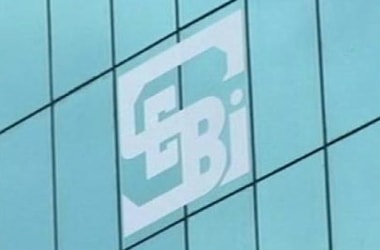 Market regulator SEBI on 26th April, 2017 decided to grant a unified licence to brokers and clearing members to operate in commodity derivative as well as equity markets. Market regulator SEBI on 26th April, 2017 decided to grant a unified licence to brokers and clearing members to operate in commodity derivative as well as equity markets.
SEBI’s board approved a proposal for integration of stock brokers in equity and commodity derivative space.
Following this, a broker or clearing member dealing in the securities markets will be allowed to buy, sell or deal in commodity derivatives without setting up a separate entity and vice-versa.
To enable the integration, SEBI will amend norms pertaining to stock broker and securities contract regulations.
The integration of stock brokers in equity and commodity derivative markets while having many synergies in terms of trading and settlement mechanism, risk management, redressal of investor grievances, etc would benefit investors, brokers, stock exchanges and SEBI.
Besides, it will increase economic efficiency in terms of meeting operational and compliance obligations at the member level, potentially resulting in ease of doing business.
Also, the integration will help in widening market penetration and facilitate effective regulatory oversight by stock exchanges and SEBI.
Bolstering steps to curb any flow of illicit funds in markets, SEBI also decided to bar resident as well as non-resident Indians from making investments through participatory notes.
The decision is part of efforts to strengthen the regulatory framework for offshore derivative instruments (ODIs), commonly known as participatory notes (P-Notes).
These have been long seen as being possibly misused for routing of black money from abroad.
The notional value of these instruments has declined over the years from 55.7% of overall FPI investments in June 2007 to just 6.7% in December 2016.
P-Note investments may now start coming from other jurisdictions like the US, France and the Netherlands after tightening of rules for inflows from Mauritius, Singapore and Cyprus.
|
▼ Mundra Port now India's largest container handling port [04-26-17]
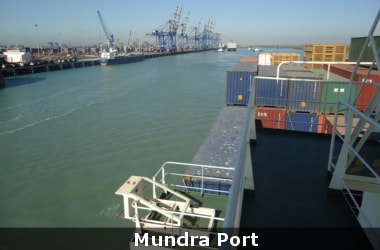 French shipping group CMA CGM and Adani Ports and Special Economic Zone have signed a joint venture agreement, to operate a new container terminal (CT4) at Mundra Port in Gujarat. French shipping group CMA CGM and Adani Ports and Special Economic Zone have signed a joint venture agreement, to operate a new container terminal (CT4) at Mundra Port in Gujarat.
This is for next 15 years with an option to extend it twice for 10 more years.
The two have completed the CT4 project three months ahead of schedule. CT4 will be the only container terminal on the west coast where the world’s largest container ships can call.
CT4 has four units of 65 tonnes capacity of Rail Mounted Quay Cranes capable of handling 18,000 TEU vessels and Super Post and Ultra Large Container Vessels and an annual capacity of 1.3 million TEUs.
For CMA CGM, CT4 is its first port investment in India.
CMA CGM is present in India since 1984.
With around 4,000 staff members and 29 offices, it is calling 13 ports in India, and offers to its Indian customers 11 direct weekly shipping services.
This new investment adds to the 27 container terminals that CMA CGM has today in its portfolio.
With the commissioning of this terminal, Mundra port will become India’s largest container-handling port.
Indian Ports: Know More
- India has a coastline spanning 7516.6 kilometres.
- This forming one of the biggest peninsulas in the world.
- According to the Ministry of Shipping, around 95 per cent of India's trading by volume and 70 per cent by value is done through maritime transport.
|
▼ HCL acquires UFS [04-25-17]
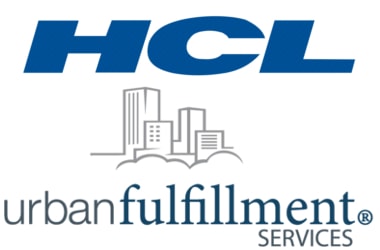 HCL Technologies on 24th April acquired announced the acquisition of U.S.-based provider of mortgage business process and fulfilment services - Urban Fulfillment Services (UFS) - for USD 30 million. HCL Technologies on 24th April acquired announced the acquisition of U.S.-based provider of mortgage business process and fulfilment services - Urban Fulfillment Services (UFS) - for USD 30 million.
The deal with UFS, which has more than 350 employees and operates out of three centres in the U.S., strengthens HCL’s capabilities in mortgage BPO services, loan fulfilment and debt servicing space.
The company said that the it would be acquiring 100% stake in UFS. The total cash consideration for this transaction is up to $30 million, including contingent payments subject to certain financial milestones.
Mortgage servicing is a regulated activity in the U.S. and the transaction requires would require regulatory approvals for getting licences.
|
▼ World bank to provide USD 375 m loan [04-24-17]
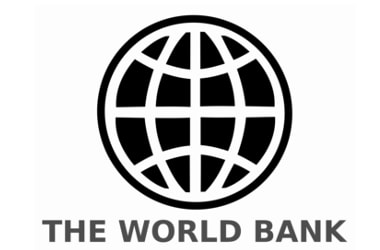 The World Bank has approved a loan of $375 million (around Rs 2,421 crore) for capacity augmentation of National Waterway-1 (NW-1) between Haldia in West Bengal and Varanasi in Uttar Pradesh on the river Ganga under the Jal Marg Vikas Project (JMVP). The World Bank has approved a loan of $375 million (around Rs 2,421 crore) for capacity augmentation of National Waterway-1 (NW-1) between Haldia in West Bengal and Varanasi in Uttar Pradesh on the river Ganga under the Jal Marg Vikas Project (JMVP).
The project would enable commercial navigation of vessels of 1,500-2,000 deadweight tonnes capacity along a 1,390-km stretch.
Jal Marg Vikas Project is a project on the river Ganga that envisages the development of waterway between Allahabad and Haldia that will cover a distance of 1620 km.
It aims to develop a fairway with three metres depth to enable commercial navigation of at least 1500 tonne vessels on the river.
The project includes the development of fairway, multi-modal terminals, strengthening of open river navigation technique, conservancy works, modern River Information System (RIS) etc.
As a part of the project, Inland Waterways Authority of India will set up a River Information Service System on NW-1, the first of its kind in India.
Besides, three multi-modal terminals, one each at Varanasi, Sahibganj (Jharkhand), Haldia; and inter-modal terminals at Kalughat and Ghazipur; a navigation lock at Farakka; and five Roll on-Roll off (Ro-Ro) terminals would be constructed.
Inland Waterways Authority of India: Know More
- Inland Waterways Authority of India (IWAI) is the statutory body in charge of the waterways in India. Its headquarters are in Noida, UP.
- Its main function is to build the necessary infrastructure in the inland waterways, surveying the economic feasibility of new projects and also carrying out administration and regulation.
River Information system (RIS): Know More - RIS is a blend of modern tracking equipment comprising of hardware and software designed to optimise transport and traffic processes in inland water navigation.
- The system has the capacity to enhance swift electronic data transfer between mobile vessels and Base stations through advance and real-time exchange of information.
- It enables safe and effective inland water transport by avoiding risks such as Ship-to-Ship collisions, Ship-Bridge collisions, Groundings.
- IWAI is implementing RIS in India.
|
▼ Indian tourism FEE on a high [04-24-17]
Ministry of Tourism estimates monthly Foreign Exchange Earnings (FEEs) through Tourism in India, both in rupee and dollar terms. Based on the credit data of Travel Head from Balance of Payments of RBI.
The highlights of the estimates of FEEs from Tourism in India for March 2017 are as below:
FEEs during the month of March 2017 were INR.14, 953 crore as compared to INR 13,115 crore in March 2016 and `11,133 crore in March 2015.
The growth rate in FEEs in rupee terms in March 2017 over March 2016 was 14.0% compared to positive growth of 17.8% in March 2016 over March 2015.
FEEs during the period January- March 2017 were Rs. 46,310 crore with a growth of 14.6%, as compared to the FEE of Rs. 40,411 crore with a growth of 15.9% in January- March 2016 over January- March 2015.
FEEs in USD terms during the month of March 2017 were USD 2.268 billion as compared to FEEs of USD 1.958 billion during the month of March 2016 and USD 1.783 billion in March 2015.
The growth rate in FEEs in US$ terms in March 2017 over March 2016 was 15.8% compared to a positive growth of 9.8% in March 2016 over March 2015.
FEEs during the period January-March 2017 were USD 6.907 billion with a growth of 15.4% as compared to the FEE of USD 5.986 billion with a growth of 6.8% in January- March 2016 over January- March 2015.
Ministry of Tourism: FTAs - Ministry of Tourism compiles monthly estimates of Foreign Tourist Arrivals (FTAs) & FTAs on e- Tourist Visa on the basis of Nationality-wise, Port-wise data received from Bureau of Immigration (BOI).
- The number of FTAs in March, 2017 were 9.05 lakh as compared to FTAs of 8.17 lakh in March, 2016 and 7.29 lakh in March, 2015.
- The growth rate in FTAs in March, 2017 over March, 2016 is 10.7% compared to 12.1% in March, 2016 over March, 2015.
- FTAs during the period January- March 2017 were 28.45 lakh with a growth of 13.4%, as compared to the FTAs of 25.08 lakh with a growth of 10.0% in January- March 2015 over January- March 2014.
- The percentage share of Foreign Tourist Arrivals (FTAs) in India during March 2017 among the top 15 source countries was highest from Bangladesh followed b y USA, UK, Russian Fed., Malaysia, Canada Germany , Sri Lanka, China, France, Australia, Japan, Afghanistan, Singapore and Iran.
|
▼ C-DOT launches CCSP( C-DOT Common Service Platform) [04-24-17]
Government of India’s announcement of Smart Cities project in mission mode has generated a lot of interest.
The concept of smart cities is incomplete without intervention of communication and Information Technology.
C-DOT has developed CCSP(C-DOT Common Service Platform), the oneM2M standards compliant common service platform which can be deployed on any off-the-shelf generic server platforms or cloud infrastructure.
The business application providers can deploy their oneM2M compliant applications in either co-located infrastructure or on any public or private cloud.
Using the CCSP platform from C-DOT, the smart cities can reap all the benefits of using a standards compliant horizontal service layer and thus be more efficient, economical and future proof.
Along with the CCSP C-DOT has also developed various oneM2M indigenously designed hardware nodes like AND (Application Dedicated Node), ASN (Application Service Node) and MN(Middle node).
To effectively showcase the strength of the platform, C-DOT has also developed various applications like Smart Living, Smart Street Light, Carbon Footprint Monitoring Application and Power Monitoring which are fully oneM2M compliant.
C-DOT has also participated in two international interoperability events where the CCSP and the ADN were tested for interoperability with many other oneM2M compliant nodes from various international organisations like Interdigital, Herit, Huawei, HPE, NTT, KETI, LAAS-CNRS etc. C-DOT also participated in the conformance testing with ETSI.
Telecommunications Standards Development Society, India (TSDSI), the Indian telecom Standards Development Organisation (SDO) and European Telecommunications Standards Institute (ETSI have joined hands to unroll a collaboration project on ICT Standardisation.
Recognising C-DOT’s R&D strengths, an India - European Union project called ‘India-EU Cooperation on ICT-Related Standardisation, Policy and Legislation’ is organising a workshop on “Future proof smart cities with a common service layer: a standards driven approach”.
The workshop aims to provide a platform where foreign and Indian experts from IoT and M2M forums, academia, R&D, industry and senior officials from Ministries of Communications, Urban Development and Electronics and Information Technology and cities named in Indian Smart Cities project can interact to share knowledge and experience
PDO: Know More - C-DOT PDO is ready to bring yet another revolution by taking internet connectivity to every nook and corner of the country like it did in the 1980s when PCOs changed the Indian telecom scene in by taking telephones to rural India.
- C-DOT hopes that PDOs would bring next telecom revolution by taking internet connectivity to the masses.
- Like PCOs, the PDOs would enable small shop owners increase their income by selling data vouchers. This will also encourage village-level entrepreneurship and provide strong employment opportunities, especially in rural and semi urban areas.
|
▼ Govt promotes Make in India in metro procurement projects [04-24-17]
With rapid expansion of metro rail projects in the country, Ministry of Urban Development has taken several far reaching decisions to promote Make in India campaign.
These include stipulating certain mandatory conditions to be incorporated in Tender Documents of metro companies for procurement of metro cars and related critical equipment and sub-systems, procurement of only Made in India signalling equipment besides standardizing technical parameters for rolling stock (metro coaches) and signalling equipment.
The new mandatory Tender Conditions and standardized norms for a wide range of equipment, approved by the Minister of Urban Development Shri M.Venkaiah Naidu have been circulated to all the metro companies making them effective immediately.
These initiatives will incentivize setting up manufacturing facilities in the country by increasing the volumes of procurement of rolling stock and all kinds of equipment by removing variations in the present technical norms for rolling stock and signalling equipment.
This will in turn result in reduction of cost through economies of scale.
The Ministry has stipulated the following mandatory conditions to be incorporated in Tender Documents:
1. Minimum 75% of the tendered quantity of metro cars shall be manufactured indigenously with progressive indigenization of content, for which the contractor may either establish independent manufacturing facility in India or partner with Indian manufacturers, if the procurement is more than 100 cars;
2. To facilitate ease in maintenance through easy availability of spares beyond the warranty period, an identified list of critical equipment and sub-systems shall be included in the Tender Document for ensuring indigenous manufacturing of a minimum of 25% of such equipment, either by Original Equipment Manufacturers themselves by establishing a wholly owned subsidiary in India or through Indian manufacturers;
3. Requirement of metro cars at State level shall be clubbed to enable applicability of local procurement norms; and
4. To develop in-house expertise on long term basis, metro companies with large size fleet to undertake in-house maintenance.
Source: PIB
A total number of 1,912 metro coaches are currently operational in the country with another 1,420 under procurement.
Over the next three years more than 1,600 metro cars would be required. Each metro coach is estimated to cost about INR .10 cr.
The long pending standardisation of norms for rolling stock and signalling equipment applicable to over 90% of the present imports.
Further, to promote indigenous manufacturing, the Ministry has stipulated procurement of 9 types of signalling equipment from within the country.
Metro companies have also been directed to develop maximum possible local competence so that knowhow and technical support is available within the country.
Indian companies have to be associated with production of a wide range of signalling and train control project equipment.
Homogenization of several metro functions has also been prescribed.
Presently, metros are operating in 7 cities of Delhi, Kolkata, Mumbai, Jaipur, Gurgaon, Bengaluru and Chennai with a total route length of 326 kms.
Metro projects with a total route length of 546 kms are under construction in 11 cities and projects with a total route length of 903 kms in 13 cities are under consideration.
|
▼ SBI most valued PSU [04-21-17]
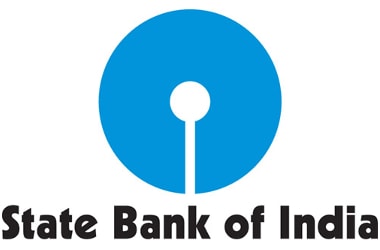 State Bank of India on April 20, 2017 yet again surpassed energy behemoth ONGC to become the country's most-valued PSU by market valuation. State Bank of India on April 20, 2017 yet again surpassed energy behemoth ONGC to become the country's most-valued PSU by market valuation.
In the past few days, a game of musical chair was being played out between SBI and ONGC for the title of most-valued PSU.
SBI on Tuesday for the first time toppled ONGC as the most-valued PSU.
The market capitalisation (m-cap) of SBI at the end of recent trade stood at INR 2,31,049.83 crore. This was Rs 757.42 crore more than ONGC's valuation of Rs 2,30,292.41 crore.
ONGC has been the country's most valued firm across private and public sectors for some time a few years ago, when it first toppled RIL from the top of the charts and then also TCS from the pole position.
Shares of SBI today rose by 0.25 per cent to close at Rs 284.90, while ONGC ended at Rs 179.45, down 0.22 per cent on BSE.
In the top-10 ranking, SBI stands at sixth place and ONGC at seventh spot.
Most Valued Indian Firms
- TCS is the most-valued Indian firm with a market valuation of Rs 4,58,784.59 crore,
- RIL (Rs 4,45,237.53 crore) is second.
- HDFC Bank (Rs 3,74,631.37 crore) is third.
- ITC (Rs 3,39,397.88 crore) is fourth.
- HDFC (Rs 2,40,992.68 crore), at fifth place.
- SBI, ONGC, Infosys (Rs 2,13,076.07 crore) are sixth.
- IOC (Rs 2,07,589.94 crore) comes 7th.
- HUL (Rs 1,98,276.07 crore) is 8th.
|
▼ Asset Vantage acquires Financial Navigator [04-20-17]
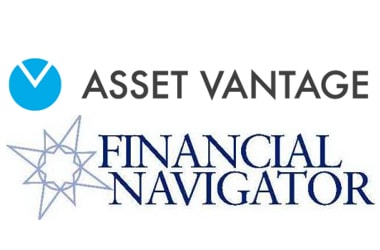 Mumbai based fintech company Asset Vantage offers a SaaS based investment portfolio management software. Mumbai based fintech company Asset Vantage offers a SaaS based investment portfolio management software.
It has acquired Santa Clara based software company Financial Navigator, a 30 year old American company running a portfolio tracked software focused on wealth management market.
Asset Vantage was founded by UniDEL, a family office run by Sunil Dalal, with a focus on wealthy individuals and family office.
Asset Vantage entered the US in 2015, organically building up a customer base of 12 family offices.
|
▼ Myntra acquired InLogg [04-20-17]
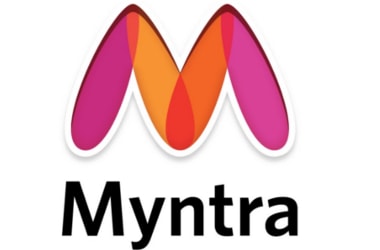 Fashion e-tailer Myntra has acquired Bengaluru based InLogg for a non disclosed amount. This will strengthen the supply chain capabilities of the Flipkart owned company. Fashion e-tailer Myntra has acquired Bengaluru based InLogg for a non disclosed amount. This will strengthen the supply chain capabilities of the Flipkart owned company.
Founded in 2015, InLogg offers a technology platform that provides end-to-end logistics solutions for the e-commerce sector.
As part of the acquisition, the team at InLogg has been inducted into Myntra, making it an acquihire that will further strengthen and expand Myntra's supply chain capabilities.
The core management team of InLogg comprises Preeti Jain (CEO), Rajat Khanduja (CTO), Prateek Gautam (Head of Product and Operations) and Hemant Agrawal, Head of Business Development.
With an 80 per cent year-on-year growth, the company on a strong trajectory.
The Inlogg acquihire with the platform and capabilities will help the company scale while delivering great customer experience in Tier II, III and IV cities.
It will allow Myntra to leverage local and regional players to enhance its reach, reduce delivery time and develop a plug-and-play model which can be scaled in the future.
Acquisitions by Myntra
- This is the fourth technology-led acquisition for Myntra.
- It has acquihired Bengaluru-based based tech startup Cubeit (2016) and mobile app development company Native5 (2015).
- It had also acquired Fitiquette, a San Francisco-based technology solution firm, which offered a virtual fitting room, in 2013.
|
▼ SEBI to amend FPI regulations, bar NRIs from p-notes [04-19-17]
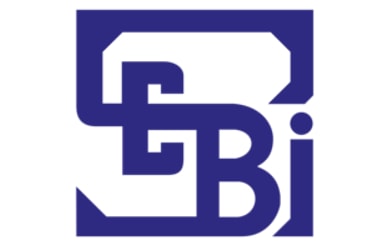 Capital and commodities market regulatory authority SEBI is set to amend the FPI regulations to formally bar Indians, NRIs and entities beneficially owned by NRIs from being beneficial owners of participatory notes. Capital and commodities market regulatory authority SEBI is set to amend the FPI regulations to formally bar Indians, NRIs and entities beneficially owned by NRIs from being beneficial owners of participatory notes.
PNs are derivative instruments issued by foreign institutional investors to overseas clients who want to invest in Indian securities, but do not want to register with SEBI, for reasons perfectly legitimate or even dubious.
The underlying asset could be shares, derivatives or debentures.
Till now, the restriction on Indians and NRIs from being beneficial owners was imposed by way of Frequently Asked Questions on the regulator’s website.
The move to include this in FPI regulations will give the restriction more legal sanctity.
Also, the move will help curb round-tripping of funds to evade taxes.
Often, money siphoned out of the country by inflating import bills and under-reporting export income is brought back through the stock market.
Foreign investors who invest in Indian through PNs are often fronts for Indian and NRI entities.
PNs are often onward issued, meaning, PNs issued to client A are then sold by A to the next client B.
The onward issuances - one or more - of PNs are done to create a layer to shield the actual beneficiary from the regulator's glare.
SEBI rules are clear if the PNs issued to a client A onward issued to another client B, the responsibility for identifying and the accountability for reporting the end beneficial owners rests entirely with the issuer, the FII.
But enforcing it is the biggest challenge for the regulator, given the magnitude of the foreign funds coming in through the P-note route.
At present, roughly USD 27 billion of FII holdings are through the P-note route.
|
▼ GST to keep variations in rates on same types of products at a minimum [04-19-17]
 Having opted for multiple rates under the upcoming goods and services tax (GST) regime, India is now looking to keep variations in rates on the same types of products at a minimum to ensure that the tax structure does not get any more complicated. Having opted for multiple rates under the upcoming goods and services tax (GST) regime, India is now looking to keep variations in rates on the same types of products at a minimum to ensure that the tax structure does not get any more complicated.
For example, all types of footwear or mobile phones could attract the same rate.
Single rate for one product group will bring simplicity in the structure and make implementation easier.
Globally, most regimes have a single rate. India has adopted a four-tier tax structure of 5%, 12%, 18% and 28%.
The rate applicable on most products will be 18%. The highest rate has been pegged in the GST law at 40%.
Many experts have said this structure will undermine the basic tenet of GST - a simple structure with at most two rates.
The GST Council now has to decide which goods and services go into which slabs.
The highly anticipated tax reform is expected to lift economic growth by 1-2 percentage points by removing inter-state barriers thus slashing cost and boosting efficiency.
|
▼ NPCI to develop security framework for mobile payments [04-19-17]
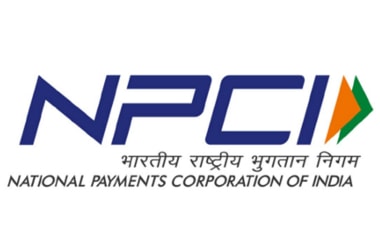 India is home to a new sense of security for mobile payments in the near future. India is home to a new sense of security for mobile payments in the near future.
It’s really no surprise to industry buffs, India is seemingly always on the cutting edge when it comes to mobile payments.
National Payments Corporation of India plans to develop a security framework exclusively for mobile phonebased payments, for banks and mobile wallets.
This is an equivalent to Payment Card Industry Data Security Standard (PCI-DSS) framework that regulates data security for card payments across the world.
In the wake of the government strategy to push digital transactions, mobile phone-based payments are becoming an important means of transactions.
But this could attract hackers and fraudsters that seek to exploit the systems.
NPCI, the umbrella organisation of payments in India, wants to build new security standards for mobile payments to prevent any major loss of public money, a top official said.
|
▼ Cash and ATM management companies to attract 100% FDI investment [04-19-17]
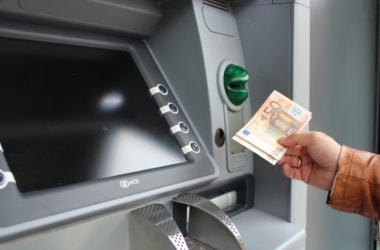 Cash and ATM management companies will soon be allowed to attract 100 per cent foreign direct investment. Cash and ATM management companies will soon be allowed to attract 100 per cent foreign direct investment.
They are not required to comply with the Private Security Agencies (Regulation) Act (PSARA).
The clarification will be against the backdrop of the confusion among firms in cash and ATM management relating to compliance with the Act, under which they can receive FDI only up to 49 per cent.
The issue was discussed at a meeting convened by the Prime Minister’s Office (PMO) last month.
There are about a dozen cash management players in the country, including Writer Safeguard, SIS Securitas, CMS, Secure Value, Logicash, Brinks Arya, Securitrans and Scientific Security Management Services.
According to experts, companies managing cash for banks have so far been caught in a policy tangle, with the home ministry insisting that 100 per cent FDI could not be allowed for them if they provide private security guards or armoured vehicles.
Companies that make devices such as currency authenticators and sorting and currency counting machines will also benefit from this clarification.
Several players, including TVS Electronics and ITI, are in such businesses.
Cash Management companies handle over Rs 40,000 crore of cash per day.
The government in 2015 permitted 100 per cent FDI under the automatic route for white label ATM operations with an aim to promote financial inclusion.
FDI into the country grew 22 per cent to USD 35.85 billion during April-December of 2016-17.
Foreign investment is considered crucial for India, which needs around USD 1 trillion for overhauling its infrastructure such as ports, airports and highways to boost growth.
A strong inflow of foreign investments also helps improve balance of payments and strengthen the rupee against other global currencies, especially the dollar.
|
▼ GPL inks pact for Taj Hotel [04-18-17]
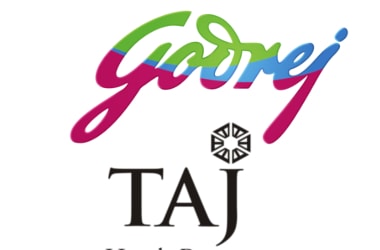 Godrej Properties Lid (GPL), the real estate arm of the Godrej Group, has entered into an agreement with Taj Hotels Palaces Resorts Safaris. Godrej Properties Lid (GPL), the real estate arm of the Godrej Group, has entered into an agreement with Taj Hotels Palaces Resorts Safaris.
This is to develop a Taj brand hotel at its flagship project, The Trees, in Vikhroli, Mumbai.
The Taj at The Trees will have 150 rooms and suites along with dining, entertainment, and conferencing facilities.
The Trees is a mixed-use development which contains a commercial precinct spread across 9.4 acres, which houses Godrej One, the Godrej Group’s global headquarters.
Taj Hotels: Know More
- CEO: Rakesh Sarna
- Headquarters: Mumbai
- Parent organization: Tata Group
- Major Subsidiaries: Vivanta By Taj, TajAir.
|
▼ ADAG's Reliance Defence inks pact [04-18-17]
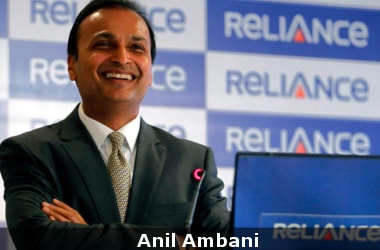 Anil Ambani-led Reliance Defence has entered into a strategic partnership with leading South Korean defence major LIG Nex1. Anil Ambani-led Reliance Defence has entered into a strategic partnership with leading South Korean defence major LIG Nex1.
This is to jointly explore opportunities in the supply of weaponry and ammunition systems to the Indian Army.
As part of the agreement, both companies will explore opportunities in the identified range of defence products required by the armed forces, according to a company statement.
LIG Nex1 is emerging as a leader in smart heavy weapons in the category of anti-ship missiles, anti tank guided missiles (ATGMs) and guided rockets, the statement said.
Currently, there are multiple programmes for the Indian armed forces that the two companies plan to address together.
This will potentially include improvements to the existing weapon systems which are part of LIG Nex1 portfolio to meet the specific requirements of the army.
The cumulative value of the programmes being targeted will exceed many billion dollars.
The two companies have also identified air defence and surveillance radar, that can be manufactured in India, as potential area for co-operation, the statement said.
The firms will also work on performance enhancement for various systems/platforms in the portfolio of LIG Nex1 to meet the specific requirements of the Army.
India and South Korea relations were upgraded to Special Strategic partnership during PM Modi's visit.
Skills developed and the experience gained through this collaboration will further add to Reliance Group’s capabilities and establish lead position in the Indian Market.
Reliance Defence: Know More
- Headquarters: Navi Mumbai
- Founded: 1997
- Number of employees: 4000
- Founders: Nikhil Prataprai Gandhi, Bhavesh Prataprai Gandhi
- Major Subsidiary: Pipavav Lighter than Air Systems Private Limited.
|
▼ MP signs agreement for solar park [04-18-17]
 Madhya Pradesh has signed project agreements with solar power companies on April 17, 2017 for Rewa Ultra Mega Solar Park. Madhya Pradesh has signed project agreements with solar power companies on April 17, 2017 for Rewa Ultra Mega Solar Park.
IFC, a member of the World Bank Group, is the lead transaction advisor for this project that will mobilise USD 550 million in private investment and avoid a million tonnes of GHG (Greenhouse gas) emissions.
The project is led by Rewa Ultra Mega Solar Limited (RUMSL), a joint venture between the Solar Energy Corporation of India (SECI) and Madhya Pradesh Urja Vikas Nigam Limited (MPUVN).
The first year tariff for the project had dropped to an all-time low of INR 2.97 per unit under a competitive bidding.
The Rewa solar park transaction will have an enormous ripple effect, helping create new markets for large solar projects across India and the region.
MP has partnered state and national government agencies for years to develop the solar market in India - from rooftops to mega solar parks - and the agreements signed will help India be a global leader in renewable energy and secure a clean, sustainable future.”
The 750 MW capacity project was auctioned in three packages of 250 MW each, and will be one of the biggest single site solar project in the world.
The three winning bidders for the project are Mahindra Renewables, ACME Solar, and Solenergie Power.
The winning bidders signed two sets of power purchase agreements with the Madhya Pradesh Power Management Corporation Ltd (MPPMCL) and the Delhi Metro Rail Corporation.
About 24 per cent of energy from the park is being sold to the Delhi Metro which will meet about 80 per cent of its daytime energy requirement.
IFC Funding Rewa Solar Park: Know More
- The Rewa solar project will also receive financing from the World Bank, which is helping India deliver on its solar ambitions with more than USD 1 billion in lending over FY2017.
- It will also be supporting the India-led International Solar Alliance, which aims to promote solar use globally by mobilising USD 1 trillion in investments by 2030.
- India is IFC's top country in terms of exposure, globally.
- IFC's committed portfolio in India is over USD 5 billion as of June 30, 2016. In FY16, IFC committed USD 1.1 billion in new investments in the country.
|
▼ BHIM Aadhaar platform for merchants launched [04-18-17]
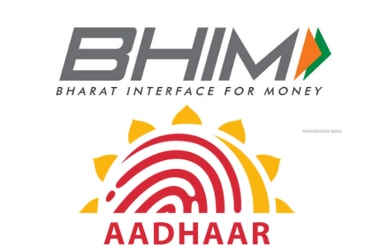 PM Narendra Modi launched a series of initiatives on the 126th birth anniversary of Dr. Bhim Rao Ambedkar in Nagpur on April 14, 2017. PM Narendra Modi launched a series of initiatives on the 126th birth anniversary of Dr. Bhim Rao Ambedkar in Nagpur on April 14, 2017.
He launched the BHIM Aadhaar platform for merchants, Cash back and Referral bonus schemes for BHIM and declared about 75 townships going less-cash.
The Prime Minister felicitated the winners of the Mega draw of the two major incentive schemes to promote digital payments- Lucky GrahakYojana and DigidhanVyapaarYojana..
BHIM-Aadhaar, the merchant interface of the BHIM App, will pave the way for making digital payments by using the Aadhaar platform.
Any Indian citizen can pay digitally using their biometric data like their thumb imprint on a merchants’ biometric enabled device which could be smart phone having a biometric reader.
Any citizen without access to smart phones, internet, debit or credit cards will be able to transact digitally through the BHIM Aadhaar platform.
Already, 27 major banks are now on board with 7.15 lakh merchants so that they can start accepting payments using BHIM Aadhaar.
The Prime Minister also launched two new incentive schemes for the BHIM – Cash back and Referral bonus – with an outlay of Rs. 495 crore for a period of six months.
This is to ensure that the culture of digital payments permeates down to the grassroots.
The initial two incentives schemes viz., Lucky GrahakYojana and DigiDhanVyaparYojana, came to an end after a rigorous 100 day information, education and communication campaign led by NITI Aayog
|
▼ BBB launches GRAF for PSBs. [04-17-17]
To prime public sector banks (PSBs) to hold their own against nifty private sector rivals and also prepare them for possible mergers in the future, GRAF has been proposed.
The Bank Boards Bureau (BBB) has drawn up an elaborate Governance, Reward and Accountability Framework (GRAF).
The GRAF seeks to ensure that corporate governance at PSBs is in keeping with various pieces of legislation, including the Companies Act, 2013, Banking Regulation Act, 1949, and Securities and Exchange Board of India (listing obligations and disclosure requirements) Regulations, 2015.
RBI issues provisions: Know More - The Reserve Bank of India (RBI) has issued a new set of enabling provisions to resolve the problem of banks’ mounting non-performing assets (NPAs), or bad loans.
- Through the notification titled “Revised Prompt Corrective Action (PCA) framework for banks. The new set of provisions, effective from April 1, override the existing PCA framework, and are based on the financials of each bank as of March 2017.
- The new framework will be reviewed after three years.
|
▼ FBRM launches autonomous fiscal council [04-17-17]
The committee report on the Fiscal Responsibility and Budget Management (FRBM) law’s recommendation for a new fiscal council to monitor implementation comes after studying the examples of 40 other countries, advanced and emerging.
The panel, whose report was made public, has proposed the Council as an autonomous body but under the finance ministry.
The proposal is part of its draft Debt Management and Fiscal Responsibility law, meant to replace the existing FRBM Act.
MF: Know More - Formed: 29 October 1946
- Jurisdiction: Government of India
- Headquarters: North Block, Cabinet Secretariat, Raisina Hill, New Delhi - 110 001
- Cabinet minister: Arun Jaitley
- Minister of state: Santosh Gangwar, Arjun Ram Meghwal
- Key Programs: Pradhan Mantri Jan Dhan Yojana
- Key Departments: Department of Economic Affairs.
|
▼ ABNL to merge with Grasim [04-14-17]
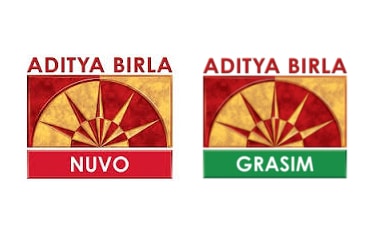 Shareholders of ABNL, ABFSL and Grasim Industries Limited in April 2017 approved the amalgamation of Aditya Birla Nuvo Limited with Grasim. Shareholders of ABNL, ABFSL and Grasim Industries Limited in April 2017 approved the amalgamation of Aditya Birla Nuvo Limited with Grasim.
The shareholders also approved the demerger and listing of Aditya Birla Financial Services Limited, part of ABFSL.
The merged Grasim entity will have a consolidated turnover of INR 59,766 crore, EBITDA of INR 11,961 crore and net profit of INR 4,245 crore for year closing March 2016.
This will be the number 1 cement company in India with the largest selling brands. The new entity will also have the distinction of being the third largest telecom operator in India and a leading player in textiles and chemicals.
Other key statistics
- Among the top 5 fund managers in India with funds under management of Rs 2,29,500 crore
- Among the top 7 private non-HFC NBFCs in India with a lending book of Rs 29,852 crore
- Among the top 4 private sector life insurers and asset management companies in India
The merger is subject to the final approval from the National Company Law Tribunal (NCLT), the Bombay Stock Exchange (BSE) and the National Stock Exchange (NSE). It is a conglomerate having leadership positions in cement, viscose staple fibre and chemicals businesses. Its subsidiary UltraTech Cement Ltd is the largest Indian cement manufacturer with a capacity of 69.3 million tons per annum and is also the largest in the white cement and ready mix concrete segment. It is a conglomerate with leadership positions across its businesses. Its Financial Services Business ranks among the top 5 fund managers in India. Its telecom venture, Idea Cellular, is among the top 3 cellular operators in India. Recently, it received a license from RBI to commence Payments Bank operations in a joint venture with Idea Cellular. Grasim: Know More- Headquarters: Nagda
- Founded: 1948, Mumbai
- Subsidiaries: UltraTech Cement, Grasim Bhiwani Textiles, more
- Parent organization: Aditya Birla Group
|
▼ Co Chairman of Infosys is Ravi Venkatesan [04-14-17]
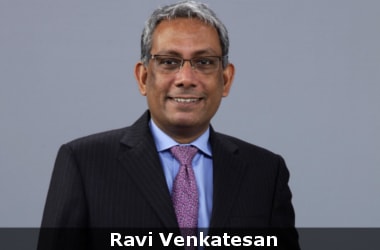 Infosys on April 13, 2017 appointed Independent Director Ravi Venkatesan co-Chairman amid calls from founders to diversify the board. Infosys on April 13, 2017 appointed Independent Director Ravi Venkatesan co-Chairman amid calls from founders to diversify the board.
The Board expansion comes against the backdrop of an ongoing tussle between the founders and the management over contentious issues such as CEO salary hike, severance package to former employees and corporate governance standards.
Venkatesan, who has been on the Infosys Board since April 2011, has made valuable contribution to the development of strategic direction of the company during his tenure, according to a company statement.
|
▼ RBI PCA for banks [04-14-17]
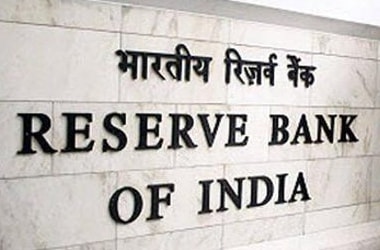 The Reserve Bank of India (RBI) has come out with a revised prompt corrective action (PCA) framework for banks, spelling out certain thresholds, the breach of which could invite resolutions such as a merger with another bank or even shutting down of the bank. The Reserve Bank of India (RBI) has come out with a revised prompt corrective action (PCA) framework for banks, spelling out certain thresholds, the breach of which could invite resolutions such as a merger with another bank or even shutting down of the bank.
The revised norms have set out three thresholds.
The breach of the third one on capital would identify a bank as a likely candidate for resolution through tools like amalgamation, reconstruction, winding up etc.
The provisions of the revised PCA framework will be effective from April 1, 2017 based on the financials of the banks for the year ended March 31, 2017.
The framework would be reviewed after three years, the RBI said.
The thresholds are based on capital, net non-performing assets, profitability and leverage ratio.
The breach of the first threshold will invite restriction on dividend distribution or require parents of foreign banks to bring in more capital.
This will get triggered if capital adequacy ratio (including capital conservation buffer) falls below 10.25% or common equity tier-I (CET1) capital ratio falls below 6.75%.
Breach of either CAR or CET1 would trigger corrective action, the RBI said. The trigger for net NPA is 6% and 4% for leverage ratio.
Two consecutive years of negative return on assets (RoA) will also be classified in threshold one.
The breach of the second threshold will occur when the capital adequacy ratio falls below 7.75% or CET1 goes below 5.125%.
The net NPA threshold is breach of 12% and leverage ratio below 3.5%.
Three consecutive years of negative ROA will also trigger threshold two. Breach of threshold two will result in restrictions on expansion of branches and higher provisions.
The breach of the last threshold happens when CET1 falls below 3.625% and net NPA goes above 12%. Negative ROA for four consecutive years will also be considered as a breach of the third threshold vis-a-vis the profitability parameter.
Restrictions, in addition to that of threshold one and two, will be put on management compensation and directors’ fees if the third level is breached.
Corrective action that can be imposed on banks includes special audit, restructuring operations and activation of recovery plan.
The RBI has said that promoters of banks can be asked to bring in new management, or even can supersede the bank’s board, as a part of corrective action.
RBI: Know More
- Established: 1 April 1935; 82 years ago
- Governor: Urjit Patel
- Central bank of Republic of India
- Currency: Indian Rupee (₹)
- Reserves: US$ 363.00 billion
- Bank rate: 6.75%
- Interest on reserves: 4.00%(market determined
- Website: rbi.org.in
|
▼ Amazon India to now run digital wallets [04-13-17]
 Amazon India has received approval from the Reserve Bank (RBI) to operate a prepaid instrument or digital wallet. Amazon India has received approval from the Reserve Bank (RBI) to operate a prepaid instrument or digital wallet.
Amazon Online Distribution Services (AODS), a subsidiary of Amazon Asia Pacific Resources, was awarded the license on March 22.
The license is valid till the end of fiscal year 2022.
The development comes at a time when the digital payments space is witnessing a high level of engagement by leading internet-based startups in the country.
Amazon invested INR 150 crore in AODS last year with the objective of participating in this space. The Seattle-based e-commerce major had applied for a wallet license.
Amazon's top rival, Flipkart, also has ambitious plans for its payments business under the PhonePe brand.
The RBI approval for Amazon sets the stage for a fierce competition between the company and Flipkart in the payments business too.
At present, Alibaba-backed Paytm is the largest wallet player in India. Other smaller players include Mobikwik and Freecharge.
Amazon Products and Services: Know More
- Industry : Internet
- Products: Appstore, AWS, The Book Depository, comiXology, Game Studios, Video, Instant Video UK, Instant Video German, Audible, Kindle, Fire, Lab126, Studios, Twitch.tv, Woot, Echo, Shopbop, Askville
- Services: Online shopping, Cloud computing, content distribution
|
▼ Paytm starts app QR new feature code [04-12-17]
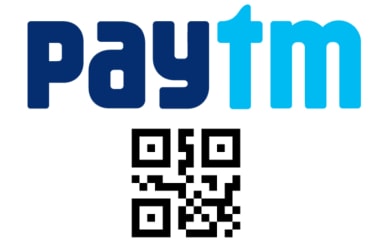 The Digital wallet company Paytm in April 2017 announced the launch of new feature QR code on its Paytm Mall application. The Digital wallet company Paytm in April 2017 announced the launch of new feature QR code on its Paytm Mall application.
This code will allow consumers to place online orders at physical stores.
With this launch, Paytm becomes the first company to invest in QR code-based payment solution.
The first product to be marketed or sold via this feature of Paytm Mall is handsets of Samsung.
This margin will be based on the product and may vary from 3 per cent to 20 per cent.
Over 95% of the population in the country still shops offline as there is a trust that exists between on offline retailer and customer.
Thus, the company wants to create an offline network as a platform for brands to reach out to millions of consumers, thereby, optimising the supply chain and marketing expenses on their behalf.
Paytm Mall was launched by Paytm in the last week of February 2017 with an aim to offer combination on the Mall and Bazaar concepts to Indian consumers.
Paytm: Know More
- Parent: One97
- CEO: Vijay Shekhar Sharma (Dec 2010)
- Founder: Vijay Shekhar Sharma
- Founded: 2010
- Headquarters: Noida, Uttar Pradesh, India
|
▼ AMD acquires Nitero IP, talent [04-11-17]
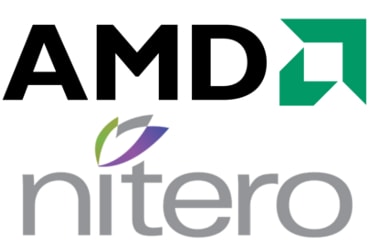 California-based semiconductor firm Advanced Micro Devices (AMD) on Monday announced it has acquired intellectual property (IP) and key engineering talent from Austin-based Nitero. California-based semiconductor firm Advanced Micro Devices (AMD) on Monday announced it has acquired intellectual property (IP) and key engineering talent from Austin-based Nitero.
It aims to enable the next generations of wireless Virtual Reality (VR) and Augmented Reality (AR) headsets.
Nitero is one of the few companies in the world capable of supplying 60 GHz mm Wave radio technologies for something like wireless VR.
Using high-performance 60 GHz wireless, this technology has the potential to enable multi-gigabit transmit performance with low latency in room-scale VR environments.
VR may be used to treat patients with mental health problems
The acquisition provides AMD with a broader portfolio of IP capable of enabling VR headset and solution providers with key technology required to create more immersive computing experiences.
AMD: Know More
- CEO: Lisa T. Su
- Headquarters: Sunnyvale, California, United States
- Revenue: 4.27 billion USD (2016)
- Founders: Jerry Sanders, Jack Gifford, Edwin Turney, Larry Stenger, John Carey, Frank Botte, Sven Simonsen, Jim Giles
|
▼ IVRI in Bareilly to set up N. India's first DNA bank [04-10-17]
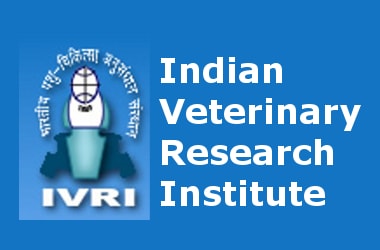 The Indian Veterinary Research Institute (IVRI) in Bareilly, Uttar Pradesh is going to set up a DNA bank for wildlife, first of its kind in North India. The Indian Veterinary Research Institute (IVRI) in Bareilly, Uttar Pradesh is going to set up a DNA bank for wildlife, first of its kind in North India.
Researchers at the institute are in the process of collecting the DNA of all wild animals. They have up until now collected samples of around 140 species.
Though the bank, the scientists at IVRI’s Centre for Wildlife will be able to tell the name and schedule of the species by studying just a part of the meat, hair, blood, skin or bone of any animal.
The centre would also be collecting serum of animals.
The move is expected to assist in research and help bring down poaching and smuggling of wildlife.
The bank would be only next to Hyderabad’s Laboratory for the Conservation of Endangered Species (LaCONES), which is currently the only such facility in India.
The bank is expected to be fully functional at the end of 2017. The Veterinary Research Institute took almost a year to collect the DNA samples of big animals like tigers, lions, elephants, rhinos, deer and leopards, which are most susceptible to illegal acclivity.
|
▼ HDFC launches UPI on app [04-10-17]
HDFC Bank launched the Unified Payment Interface (UPI) on peer-to-peer payments app Chillr. Consequently, the HDFC bank UPI will now be available on Chillr too, besides its own mobile banking app.
Chillr has been running on IMPS with 11 banks prior to this launch and claims a monthly transaction value of $77.2 Mn (INR 500Cr).
With this launch, this base will expand as 33 more banks will be able to use it besides the existing 11 banks.
As a result, Chillr is now targeting a monthly transaction value of $1 Bn.
The startup expects to see 10 Mn active transacting users by the end of the year.
Currently, the app claims to have around 3 Mn+ total user base, 50% of whom are from outside the top 10 cities.
As of date, about $463.2 Mn (INR 3,000 Cr) has been transacted with HDFC bank on the app.
The startup raised a Series A round of funding with $7 Mn from Blume Ventures, Unicorn Ventures, Sequoia Capital and others in December 2015.
|
▼ RBL Bank to open IFSC IBU in GIFT city [04-10-17]
Commencing offshore banking operations from India, RBL Bank, on April 6, 2017, announced the opening of its IFSC Banking Unit (IBU) at Gujarat International Finance Tec-City (GIFT City).
The leading private sector bank had received an in-principle approval from RBI for setting up IBU in November, 2016.
This will give RBL Bank access to international financial markets.
RBL Bank will raise foreign currency funds to meet its requirements in IBU and fund offshore subsidiaries of Indian companies, other foreign firms, and eligible Indian companies (via ECBs, bonds etc.).
Close to around USD 50 billion worth of international business is conducted outside of India in the absence of an IFSC in India.
The global financial hub at GIFT City would be able to retain a lot of this business which is now going out.
Collectively, business of IBUs, at present, at GIFT IFSC has already crossed the $ 2.5 billion mark
RBI has permitted domestic public and private sector banks to open an IFSC banking units (IBU) at GIFT City to undertake foreign exchange transactions with resident and non-resident entities other than individuals.
The IBU will give RBL Bank access to international financial markets and the bank will offer a range of products and services to its clients.
RBL Bank will raise foreign currency funds to meet its requirements in IBU and fund offshore subsidiaries of Indian companies, other foreign firms, and eligible Indian companies (via ECBs, Bonds etc.).
RBL Bank: Know More - Headquarters: Maharashtra, India
- CEO: Vishwavir Ahuja
- Founded: August 1943
- Managing director: Vishwavir Ahuja
|
▼ ADB grants USD 175 power loan [04-10-17]
The Government of India and the Asian Development Bank (ADB) signed a USD 175 million loan agreement to support construction of high voltage transmission systems.
This is to evacuate power generated from new mega solar parks to the interstate grid, and improve reliability of the national grid system.
The loan will be given to the Power Grid Corporation of India Limited (POWERGRID) and will include subprojects in various locations in India.
As an innovative feature, the project is designed to adopt the country systems on both safeguards and procurement at the agency level.
In addition to the ADB loan of USD 175 million, the project includes USD 50 million co-finance from the Clean Technology Fund (CTF).
This is a USD 5.8 billion component of the Climate Investment Funds, aimed at providing developing countries with resources to expand efforts in utilising low carbon technologies and transitioning to clean, renewable energy sources.
POWERGRID will make an equity contribution of USD 135 million to support the total project cost of $450 million.
The USD 175 million loan will be from ADB’s ordinary capital resources (OCR) and will have a 20-year term, and an annual interest rate will be applicable, determined in accordance with ADB’s London interbank offered rate (LIBOR)-based lending facility.
The USD 50 million CTF loan financing will come with a 40 year term.
The project will improve the capacity and efficiency of interstate transmission networks, particularly in transmitting the electricity generated from the new solar parks to the national grid.
Apart from the evacuation of 2,500 megawatts(MW) of power from solar parks in Bhadla, Rajasthan, and 700 MW from Banaskantha, Gujarat, POWERGRID is also including two additional subprojects that will increase solar power generation by 4.2 gigawatt and lessen carbon emissions by over 7 million tons every year.
POWERGRID would make an equity contribution of $135 million equivalent to support the total project cost of USD 450 million.
ADB: Know More - Headquarters : Mandaluyong, Metro Manila, Philippines
- Main organ : Board of Governors
- President : Takehiko Nakao
- Purpose : Social and economic development
|
▼ Mahesh Kumar Jain is IDBI CMD [04-7-17]
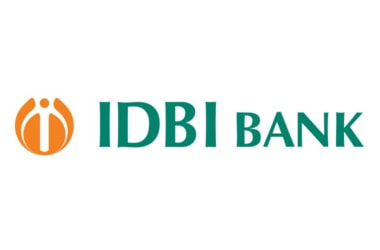 IDBI bank has appointed Mahesh Kumar Jain as the Managing Director & CEO with immediate effect. IDBI bank has appointed Mahesh Kumar Jain as the Managing Director & CEO with immediate effect.
Before his role in IDBI, Jain was the Managing Director & Chief Executive Officer of Indian Bank.
Jain joined Indian Bank as an executive director in September 2013 where he handled several key portfolios.
Prior to joining Indian Bank, Jain served as general manager with Syndicate Bank. He began his banking career with Punjab National Bank.
He was also a member of the steering committee on Risk Management of IBA and a member of the IBA working group on risk management and implementation of Basel II and III.
He was also the secretary & coordinator to Basant Seth Committee on review & revamp of internal & concurrent audit system in PSBs.
Currently, he is a member of the NIBM governing board, PGDM executive council of NIBM, CII national committee on Banking 2016-17 and CII national council on financial sector development 2016-17.
PSU Banks in India: Know More
| Bank | Location | Tagline |
|---|
| Andhra Bank | Hyderabad | Where India Banks | | Bank of Baroda | Vadodara | India’s International Bank | | Bank of India | Mumbai | Relationships beyond Banking | | Bank of Maharashtra | Pune | One Family One Bank | | Canara Bank | Bangalore | Together we Can, It’s easy to change for those who you love | | Central Bank of India | Mumbai | Central to you since 1911, Build A Better Life Around Us | | Corporation Bank | Mangalore | A Premier Public Sector Bank, Prosperity for all | | Dena Bank | Mumbai | Trusted Family Bank | | Indian Bank | Chennai | Your Tech-friendly bank | | Indian Overseas Bank | Chennai | Good people to grow with | | Oriental Bank of Commerce | Gurugram | Where every individual is committed | | Punjab National Bank | New Delhi | The Name you can Bank Upon | | Punjab & Sind Bank | New Delhi | Where series is a way of life | | Syndicate Bank | Manipal | Faithful. Friendly | | UCO Bank | Kolkata | Honors Your Trust | | Union Bank of India | Mumbai | Good people to bank with | | United Bank of India | Kolkata | The Bank that begins with “U” | | Vijaya Bank | Bangalore | A friend You can Bank Upon | | IDBI Bank Ltd | Mumbai | Banking for all; “ Aao Schein Bada” | | State Bank of India | Mumbai | The Nation banks on us; Pure Banking Nothing Else; With you all the way | | State Bank of Bikaner & Jaipur | Rajasthan | The nation banks on us | | State Bank of Hyderabad | Hyderabad | You can always bank on us | | State Bank of Mysore | Bangalore | Working for a better tomorrow | | State Bank of Patiala | Punjab | Blending Modernity with Tradition | | State Bank of Travancore | Thiruvananthapuram | A Long Tradition of Trust | | AXIS Bank | Mumbai | Everything is the same except the name | | Citi Union Bank | Tamilnadu | Trust and Excellence since 1904 | | Dhanlaxmi Bank | Tamilnadu | Tann. Mann. Dhan | | ICICI Bank Ltd | Mumbai | Hum Hain na!!,Khayaal Apka | | IndusInd Bank | Mumbai | We make money simple | | Karnataka Bank | Mangalore | Your family bank across India | | Kotak Mahindra Bank | Mumbai | Let’s make money simple | | Catholic Syrian Bank | Thrissur | Support all the way. | | Federal Bank | Kerala | Your perfect banking partner | | HDFC Bank | Mumbai | We understand your world. | | Karur Vysya Bank | Tamilnadu | Smart way to bank | | Lakshmi Vilas Bank | Tamilnadu | The Changing Face of prosperity | | Yes Bank | Mumbai | Experience our expertise | | Bharatiya Mahila Bank | New Delhi | Empowering women, Empowering India |
Source: Official Websites
|
▼ TRAI to bring new norms for mobile services [04-7-17]
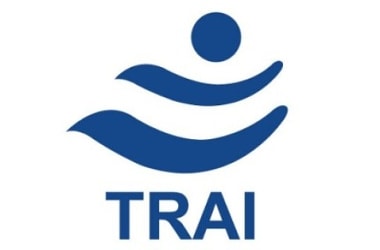 Telecom regulator Trai will bring out in the next few weeks its order on the revised quality of service norms for mobile services, including benchmarks for newer technologies like VoLTE. Telecom regulator Trai will bring out in the next few weeks its order on the revised quality of service norms for mobile services, including benchmarks for newer technologies like VoLTE.
Elaborating on the review of service quality norms, TRAI has indicated new standards like VoLTE have come up whose parameters have to be mapped equivalent to parameters of other technologies.
Interestingly, new technologies have come like VoLTE which have different names for some parameters. So, TRAI has to map them so that the service quality parameters are in place.
Tightening the noose around mobile operators over call drops, Trai last year had issued a consultation paper where it proposed stricter quality norms for local areas and graded financial disincentives for poor services.
The final views of the regulator on this consultation paper are expected now.
Airtel, Aircel and RCom's 2G service quality was below Trai norms in December quarter on the issue of regulation of Internet-based call and messaging applications termed 'Over The Top' services, TRAI noted that the regulator had previously initiated consultation on the same.
VoLTE: Know More
- VoLTE stands for voice over LTE.
- It's voice calls over a 4G LTE network, rather than the 2G or 3G connections which are usually
- 4G is not just about downloading, streaming and web browsing
- It can also be used to improve calls.
|
▼ Airtel terminates services of vice president, head of alliances [04-7-17]
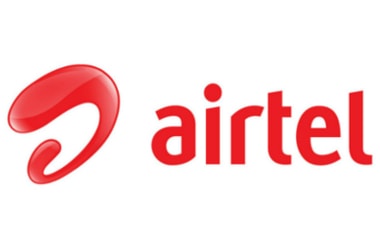 Telecom major Bharti Airtel has terminated the services of its vice president and head of alliances Pallab Mitra for alleged violation of code of conduct. Telecom major Bharti Airtel has terminated the services of its vice president and head of alliances Pallab Mitra for alleged violation of code of conduct.
The company's code of conduct is of paramount importance and it follows a policy of zero tolerance in the event of any violation of the same.
Mitra has worked with Airtel for about 12 years with a gap of around five and half years in between.
He started working with Airtel in 2001 as head of commerce for about 4 years. Mitra left the company in February 2010 to join Tata Teleservices.
His second innings at Airtel started from September 2015 onwards after his one-and-half year stint with wi-fi firm Ozone Networks.
Airtel learnt about the purported code of conduct violation by Mitra from a whistleblower.
|
▼ Repo rate unchanged: RBI unveils MPC review [04-7-17]
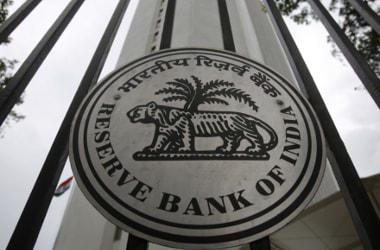 The Reserve Bank of India (RBI) kept the key policy rate, or the repo rate, unchanged in the first bimonthly policy review of 2017-18 but narrowed the policy corridor by 25 bps by raising the reverse repo rate to 6%, from 5.75%. The Reserve Bank of India (RBI) kept the key policy rate, or the repo rate, unchanged in the first bimonthly policy review of 2017-18 but narrowed the policy corridor by 25 bps by raising the reverse repo rate to 6%, from 5.75%.
All six members of the monetary policy committee (MPC) - which decides interest rates - voted in favour of the decision.
The central bank said the policy decision was consistent with the neutral policy stance with the objective of achieving the medium-term target for retail inflation, which is 4%.
The MPC saw the path of inflation in 2017-18 challenged by upside risks and unfavourable base effects towards the second half of the year.
Accordingly, inflation developments have to be closely monitored with food price pressures can be checked so that inflation expectations can be anchored.
The central bank indicated the future course of monetary policy would largely depend on incoming data on how macroeconomic conditions are evolving.
While the repo rate action was in line with market expectations, the governor’s hawkish tone disappointed bond traders who were expecting a softer tone.
Yield on the 10-year benchmark bond hardened to 6.77% as compared with its previous close of 6.65%.
The central bank has set its inflation projection to an average of 4.5% in the first half of 2017-18 and 5% in the second half, while keeping its GVA growth projection unchanged at 7.4% for FY18 as compared with 6.7% in FY17.
Surplus liquidity in the banking system had fallen from close to ?8 lakh crore in January to ₹4.8 lakh crore in March.
A standing deposit facility to the government in November 2015, was proposed approval for which was still awaited.
SDF is a mechanism to drain surplus cash at a rate lower than the repo rate without the need for any collateral.
Key Takeaways from RBI Monetary Policy review:
- RBI is optimistic about growth in FY18 and has projected Gross Value Added (GVA) growth to be 7.4 percent as against 6.7 percent last year.
- Inflation has been projected to be between 4.5-5 percent for the year with some caution being posted on the monsoon progress.
- RBI has lowered the corridor around the repo rate.
- RBI has not quite said anything specific about Non-performing assets (NPAs) but will be coming out with another paper on prompt corrective action which addresses some of the issues.
- RBI has put forward a proposal to set up a standing deposit facility to the government whereby banks can park their surplus funds with the RBI without bonds as securities.
- The Reserve Bank of India, in its first monetary policy review of financial year 2017-18, kept the repurchase (repo) rate unchanged at 6.25%, citing upward risks to inflation and global uncertainty.
- The Monetary Policy Committee, however, raised the reverse repo rate by 0.25 basis points to 6%, and cut the marginal standing facility (MSF) rate to 6.5%.
|
▼ Accenture acquires Genfour [04-5-17]
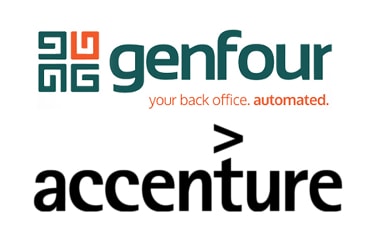 Global professional services major Accenture on April 4, 2017 acquired UK based Genfour. The automation services provider was acquired for a non disclosed sum. Global professional services major Accenture on April 4, 2017 acquired UK based Genfour. The automation services provider was acquired for a non disclosed sum.
Acquisition will strengthen the capabilities of Accenture as a leading provider of intelligent automation services.
Intelligent automation is changing the way businesses across industries operate, driving compliance, innovation, quality user experience, enhanced decision making and productivity.
Accenture has trained more than 70,000 professionals on new architectures, intelligent platforms and automation over the past year.
To date, automation solutions have been implemented for more than 80 percent of Accenture Operations clients.
Genfour's automation professionals will join the Accenture Operations global Intelligent Automation team and be an integral part of the new Accenture Center of Excellence for Intelligent Automation in the UK.
Founded in 2012, Genfour is serving clients across multiple industries, most notably in insurance, banking and utilities.
Accenture: Know More
- CEO: Pierre Nanterme (1 Jan 2011)
- Headquarters: Dublin, Republic of Ireland
- Revenue: 34.79 billion USD (2016)
- Key Subsidiaries: Avanade, Kurt Salmon, Cloud Sherpas
|
▼ Adam Nash joins Acorns board [04-5-17]
 Adam Nash, the former chief executive of digital financial advice company Wealthfront, has joined the board of U.S. micro-investing app Acorns. Adam Nash, the former chief executive of digital financial advice company Wealthfront, has joined the board of U.S. micro-investing app Acorns.
Nash, who stepped down from his role at Wealthfront in December, will advise the investment startup as it expands its breadth of products aimed at helping younger investors save.
The company also said it had appointed Shlomo Benartzi, professor and co-chair of the Behavioral Decision-Making Group at the University of California, Los Angeles, to its board.
Benartzi will help the company understand what drives saving so that it can design better products.
About Acorns
- Based in Newport Beach, California, Acorns rounds up purchases from clients' card transactions to the nearest dollar and automatically invests the change into portfolios of low-cost exchange-traded funds.
- Launched in 2014.
- The startup currently counts more than 1.6 million investment accounts.
- Investor include payments company PayPal Inc and Japanese e-commerce company Rakuten.
|
▼ Twitter loses Aliza Knox [04-5-17]
 In a yet another blow for the struggling micro-blogging website Twitter, its head of Asia-Pacific business Aliza Knox has decided to move on after a near-five year stint. In a yet another blow for the struggling micro-blogging website Twitter, its head of Asia-Pacific business Aliza Knox has decided to move on after a near-five year stint.
Knox built out Twitter's presence in Asia with an office in Singapore that currently spans nine locations with over 100 people on payroll.
Her exit comes on the back of the loss of a number of high-profile Asia-based executives in 2016.
This includes Managing Director for Southeast Asia, India, Middle East and North Africa (MENA) region Parminder Singh, India head Rishi Jaitly, China head Kathy Chen and Australia country boss Karen Stocks.
Jaitly drove strategic partnerships with the news, government, entertainment, sports, TV industries, and others in the mass and emerging media landscape.
Jaitly was the vice-president of Twitter's Asia Pacific and Middle East business.
After Jaitly, Singh announced that he has quit the company.
Following this, the micro-blogging website appointed Maya Hari as its new Managing Director for South East Asia and India who was reporting to Knox.
In a bid to realign its future goals and cut costs, Twitter had reduced nine per cent of its workforce (nearly 350 people) internationally.
In 2016, Twitter cut 300 jobs after Jack Dorsey took over as CEO full-time.
|
▼ ABB purchased Bernecker + Rainer Industrie-Elektronik [04-5-17]
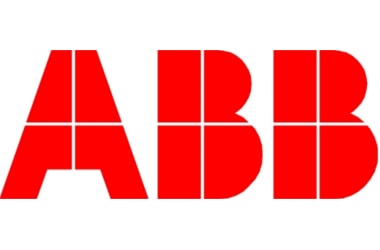 ABB has bought Austrian group Bernecker + Rainer Industrie-Elektronik, the Swiss engineering company on April 4, 2017. ABB has bought Austrian group Bernecker + Rainer Industrie-Elektronik, the Swiss engineering company on April 4, 2017.
This is helping it to challenge German rival Siemens in the industrial automation sector.
The biggest deal under Chief Executive Ulrich Spiesshofer's four-year leadership is part of ABB's strategy of expanding its product line-up beyond processing raw materials.
This is because price swings have dented demand from oil and gas companies.
B+R, which was founded by two friends in the basement of an Austrian bank in 1979, makes programmable controls for machines used by companies like Nestle, Procter & Gamble, and Roche.
The privately held company also makes components for machines used by automotive makers BMW, Daimler and Volkswagen.
Its products include industrial PCs and factory automation devices which are designed to increase productivity.
The deal increases ABB's sales in the industrial automation segment to around $15 billion and consolidates its position as number two in the $130 billion global industrial automation sector behind Siemens.
The purchase will add to ABB's industrial automation division, which has struggled in recent quarters.
Sales for the division, which also competes with Emerson , Rockwell Automation, and Schneider, fell 9 percent in 2016, while new orders dropped 20 percent, largely due to falling demand from oil and gas customers.
The B+R deal, ABB's biggest acquisition since it bought U.S. low-voltage products maker Thomas & Betts for $3.9 billion in 2012, is a departure from Spiesshofer's previous strategy.
This has focused on trimming costs and shedding fringe businesses.
ABB: Know More
- Headquarters: Zürich, Switzerland
- CEO: Ulrich Spiesshofer (15 Sep 2013)
- Revenue: 33.83 billion USD (2016)
|
▼ Jet Airways offers UPI for booking tickets [04-4-17]
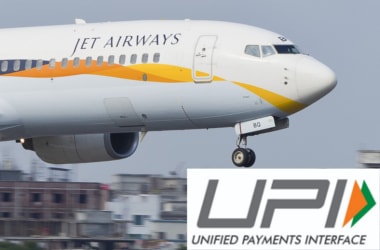 Private carrier Jet Airways fliers can now buy tickets online, using the industry's latest payment mechanism, Unified Payments Interface (UPI). Private carrier Jet Airways fliers can now buy tickets online, using the industry's latest payment mechanism, Unified Payments Interface (UPI).
The move makes the city-headquartered airline the only domestic carrier providing its customers with this convenient payment solution.
The UPI allows money to be transferred instantaneously between any two bank accounts instantly, using a smartphone.
Launched by National Payments Corporation of India (NPCI), UPI is one of the various measures by the RBI towards a less-cash and a more digital society.
|
▼ Ruia led Essar sells BPO unit [04-4-17]
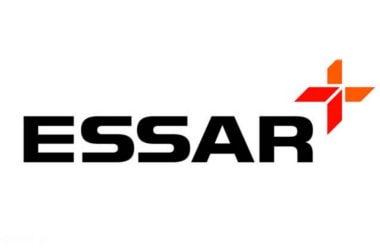 Ruias-led Essar Group has decided to sell its business process outsourcing (BPO) firm Aegis to Singapore-based Capital Square Partners for about $300 million in a bid to reduce the group debts. Ruias-led Essar Group has decided to sell its business process outsourcing (BPO) firm Aegis to Singapore-based Capital Square Partners for about $300 million in a bid to reduce the group debts.
AGC Holdings Limited (AGC) Mauritius, a wholly-owned portfolio company of Essar Global Limited (Essar Global), has entered into a definitive agreement with Capital Square Partners (CSP).
The agreement to sell 100% of its stake for an undisclosed amount in ESM Holdings Limited, Mauritius, which is the holding company of Aegis, a major global outsourcing company.
The deal size is pegged about $300 million and the net proceeds of this sale will be used to retire Essar’s debt.
Essar entered the BPO business in 2004 with the acquisition of the US-based Aegis Communications Group, with 2,000 employees.
In 2014, AGC announced the successful sale of Aegis USA Inc (comprising Aegis’ operations in the US, the Philippines and Costa Rica) to Teleperformance, thereby substantially reducing Aegis revenues and headcount.
Aegis: Know More
- Currently, Aegis has revenues of about US$400 million.
- It employs more than 40,000 people across 47 centres.
- It operates in in 10 countries with operations in India, the UAE, Sri Lanka, Malaysia, Australia, South Africa, Peru, Argentina, Saudi Arabia and the UK.
|
▼ ODA of INR 21, 590 crore from Japan [04-3-17]
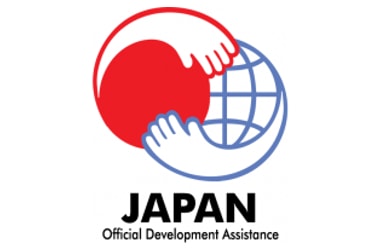 Japan has committed an "official development assistance" of 371.345 billion yen (about Rs 21,590 crore) under 2016-2017 for various infrastructure projects, including the dedicated freight corridor, in India. Japan has committed an "official development assistance" of 371.345 billion yen (about Rs 21,590 crore) under 2016-2017 for various infrastructure projects, including the dedicated freight corridor, in India.
Total commitment of JICA ODA during two financial years 2015-16 and 2016-17 is 761.40 billion yen, which is 43.50 per cent of the total target for five years, it said.
For FY 2016-17, the ODA loan assistance has been committed to several projects including:
- Mumbai Trans Harbour Link Project (JPY 144.795 billion),
- Dedicated Freight Corridor Project (Procurement of Electric Locomotives) (JPY 108.456 billion) and
- Eastern Peripheral Expressway Intelligent Transport System (ITS) Installation Project (JPY 6.87 billion).
The Mumbai Metropolitan Region Development Authority (MMRDA), a State Government entity, has been allowed to borrow directly from Japan International Cooperation Agency (JICA) Official Development Assistance (ODA) loan for Mumbai Trans Harbour Link (MTHL) project.
The estimated project cost for Mumbai Trans-Harbour Link (MTHL) is INR.17,854 crore, out of which JICA loan portion is expected to be INR 15,109 crore.
India and Japan have had a long and fruitful history of bilateral development cooperation since 1958.
In the last few years, the economic partnership between India and Japan has steadily progressed, I.
|
▼ RBI opens new dept. [04-3-17]
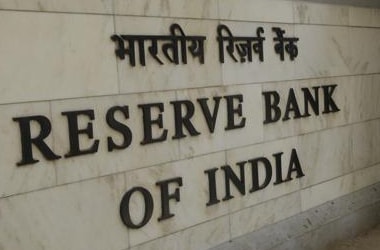 RBI will open a separate enforcement department from April 3 to oversee possible breaches of rules and take punitive actions against those who violate them. RBI will open a separate enforcement department from April 3 to oversee possible breaches of rules and take punitive actions against those who violate them.
The Enforcement Department shall, inter alia, develop a broad policy for enforcement and initiate enforcement action against the regulated entities for violation consistent with such policy.
The department proposed to be opened on April 3 would serve as a centralised wing to deal with banks only for enforcement action.
Reserve Bank of India (RBI) has reported that the net profit/loss, profit after tax (PAT) of Public Sector Banks (PSBs) declined to INR (-)17,993 crore during 2015-16 from INR 37,823 crore in 2014-15 and INR 37,019 crore in 2013-14.
At the same time PAT of private banks increased from INR 33,661 crore during 2013-14 to INR 38,735 crore in 2014-15 and further to INR 41,314 crore during 2015-16.
PAT of PSBs stood at Rs (-)1,678 crore for the period April- December, 2016 while it was INR 31,262 crore for the same period for private sector.
RBI has informed that as part of the package of measures announced on August 25, 2016 for development of fixed income and currency markets, in connection with developing the market for rupee denominated bonds overseas, it has been decided to permit banks to issue Perpetual Debt Instruments (PDI) qualifying for inclusion as Additional Tier 1 capital and debt capital instruments.
It was also decided to allow banks to issue rupee denominated bonds overseas under the extant framework of incentivising issuance of long term bonds by banks for financing infrastructure and affordable housing.
The RBI has also taken various measures to deepen the corporate bond market.
|
▼ Limit for investment in FPIs rises [04-3-17]
RBI increased the foreign portfolio investors' limits on investment in government bonds by INR 170 bn for the April-June period.
Limit for investment by FPIs in central government securities has risen by INR 110 bn while the same for SDLs rose by INR 60 bn.
On the central government securities, the cap on general category has been increased to INR 1565 bn from 1520 bn. For long term investors, the limit has risen to INR 745 bn from INR 680 bn earlier.
Total increase in investment caps for FPIs in g-secs is up INR 2310 bn from INR 2200 bn.
On the SDLs, the cap on investment by FPIs including long term ones has been moved to INR 270 bn from the earlier INR 210 bn.
The limits for the long term investors remaining unutilised at the end of March 2017 will be released for investment under the general category in April 2017.
Existing conditions, including the security-wise limits, investment of coupons being permitted outside the limits and investments being restricted to securities with a minimum residual maturity of three years, will continue to apply.
The operational guidelines relating to allocation and monitoring of limits will be issued by capital markets regulator SEBI.
RBI: Know More - The Reserve Bank of India is the central bank of the country.
- The Reserve Bank of India was set up on the basis of the recommendations of the Hilton Young Commission.
- The Reserve Bank of India Act, 1934 (II of 1934) provides the statutory basis for the functioning of the Bank, which commenced operations on April 1, 1935.
- After the partition of India, the Reserve Bank served as the central bank of Pakistan upto June 1948 when the State Bank of Pakistan commenced operations.
- The Bank, which was originally set up as a shareholder’s bank, was nationalized in 1949.
SEBI: Know More
- Founder: Government of India
- Founded: 12 April 1988
- Headquarters: Mumbai
- Number of employees: 643 (2012)
- Present chairman: Ajay Tyagi
|
▼ GoI raises record amount via disinvestment [04-3-17]
The government has raised a record INR 46,247 crore through disinvestment, of which INR 10,779 crore has come from strategic disinvestment and SUUTI's investment.
With this, the disinvestment proceeds of 2016-17 has exceeded the revised estimates (RE) of Rs 45,500 crore set in 2017-18 Budget.
Record achievement of INR 46,247 crore include INR 35,468 crore from CPSE disinvestment and INR 10,779 crore from strategic disinvestment and SUUTI's investment.
The Budget for 2016-17 had set a target of INR 56,500 crore from PSU disinvestment.
Of this INR 36,000 crore was to come from disinvestment of CPSEs and INR 20,500 crore from strategic stake sale of PSUs.
In the Revised Estimates, this target of INR 56,500 crore was scaled down to INR 45,000 crore.
|
▼ Red Hat's US Partner of the Year is TCS [04-3-17]
Leading open source solutions provider Red Hat has felicitated TCS with US partner of the year in the commercial category.
TCS was selected for innovative open source solutions for customers in the commercial sector. This drives innovative solutions and joint business in the area of data analytics, cloud and automation.
Award points to TCS's commitment to drive digital transformations.
The recognition was part of the annual Red Hat North American Partner Awards.
Red Hat: Know More - Headquarters: Raleigh, North Carolina, United States
- CEO: James M. Whitehurst (Dec 2007–)
- Revenue: 2.052 billion USD (2016)
- Key Subsidiaries: 3scale, Qumranet, Red Hat KK, Red Hat Israel Ltd
|
▼ Verizon changes operating structure [04-3-17]
Verizon Communications has announced it will change its operating structure to focus on three areas.
It has named former Ericsson CEO Hans Vestberg as part of its newly created network and technology team.
Vestberg's team will build out the company's fiber network infrastructures.
Verizon's media and telematics unit will focus on growing the company's new businesses in digital media, including integrating its pending acquisition of Yahoo Inc.
It will be led by Marni Walden as executive vice president for media and telematics.
The company's customer and product operations team, led by John Stratton, will work on operating and growing Verizon's established businesses, such as Verizon Wireless and Verizon Enterprise Solutions.
Verizon Communications: Know More - Headquarters: Basking Ridge, New Jersey, United States
- Motto: Better Matters
- CEO: John G. Stratton (17 Feb 2015–)
- Founded: 4 April 2000, Bedminster, New Jersey, United States
- Network types: Code division multiple access, LTE
- Parent organization: Verizon Communications
- Founders: Verizon Communications, Vodafone
|
| Chronology of events |
|
Five associates and the Bharatiya Mahila Bank became part of the State Bank of India (SBI) catapulting the country’s largest lender to among the top 50 banks in the world.
|
|
Axis Bank has tied up with Wells Fargo (the third largest American bank by assets) to offer real-time remittances from the Indian diaspora to their relatives back home.
|
|
Tax evasion of over Rs 5 crore under the Goods and Services Tax (GST) regime would be a non-bailable offence.
|
|
Uday Kotak, executive vice-chairman and MD of Kotak Mahindra Bank announced the launch of 8-11, a completely digital and paperless account app.
|
|
Following the merger of five associate banks and Bharatiya Mahila Bank with State Bank of India, the latter will enter the league of Top 50 Global Banks with a balance sheet size of Rs.41 lakh crore, gets new logo.
|
|
The BRICS-backed New Development Bank (NDB) has invested in seven projects totalling $1.5 billion in about two years of its operation.
|
|
Bitcoin has finally gained the recognition of a mainstream currency along the lines of other fiat currencies. The privilege follows the implementation of a new law in Japan which categorizes Bitcoin as a legal payment option within the country.
|
|
The government has exceeded the tax collection estimates for 2016-17 fiscal at INR17.10 lakh crore.
|
|
Under the Central GST (CGST) Act, tax evasion of over Rs 5 crore under the GST regime will be cognizable and non-bailable offence with the police having authority to make an arrest without a warrant.
|
|
A Malaysian company has agreed to help set up a technology park in Andhra Pradesh that’s expected to attract private sector investment of $100 million in the first phase. The Andhra Pradesh Economic Development Board and MIGHT Technology Nurturing Sdn. Bhd (MTN) have signed a memorandum of understanding.
|
|
The Entrepreneurship Development Institute of India (EDII), has said it has tied up with Human Resource Development Fund under Ministry of HRD, Malaysia, for skill development, and assist the South-East Asian country in its target of ensuring 35 per cent skilled Malaysian workforce by 2020.
|
|
The Aditya Birla Group said it has received licence from the Reserve Bank of India to start payments bank. Headed by Kumar Mangalam Birla, the group’s outfit Aditya Birla Nuvo had set up a 51:49 joint venture Aditya Birla Idea Payments Bank Ltd - with telecom major Idea Cellular to launch payments bank services in the country.
|
|
Canara Bank, a public sector bank, has embarked upon an ambitious project of upgrading the bandwidth at all its branches to 2 Mbps in partnership with BSNL.
|
|
A mega draw of lots was held at Rashtrapati Bhawan today to select the winners of the Lucky Grahak Yojana and Digi Dhan Vyapar Yojana. The President, Shri Pranab Mukherjee picked up six lucky winners on the final day of the 100 day scheme. In the consumer category, three mega Prizes of INR 1 crore, INR 50 lakh and INR 25 lakh went to the Consumers using Rupay Debit Cards making digital payment of less than INR 1000.
|
|
Samsung R&D Institute India filed the maximum number of patent applications in the IT sector in 2015-16, followed by home-grown TCS and Wipro, according to the annual report of Office of the Controller General.
|
|
The Defence Research and Development Organisation (DRDO) and Patanjali Ayurved Limited promoted by yoga guru Ramdev, have decided to sign a memorandum of understanding (MoU) to market array of herbal products developed by the DRDO’s Life Sciences wing – Defence Institute of High Altitude Research (DIHAR).
|
|
India’s largest online retailer Flipkart has closed a mammoth funding round of $1.4 billion from Tencent Holdings Ltd, eBay Inc. and Microsoft Corp., in the biggest-ever start-up funding round. Flipkart Ltd will also buy eBay’s India business.
|
|
The Bank Board Bureau (BBB) has recommended that Government should bring in reforms in the compensation process in public sector banks (PSBs) on the lines of Central Public Sector Enterprises (CPSEs).
|
|
Finnish mobile giant Nokia on 10 April 2017 signed Memorandum of Understanding (MoU) with Airtel and BSNL to work on 5G Services and connected devices in India.
|
|
All bank accounts that were opened between July 1, 2014 and August 31, 2015 will require submission of self certification forms by April 30 this year, failing which the accounts will be blocked, according to a statement issued by the Central Board of Direct Taxes.
|
|
FATCA or Foreign Account Tax Compliance Act requires that the bank accounts which were opened between July 1, 2014 and August 31, 2015 should be self-certified on self-certify forms by April 30, non-compliance will lead to account blocking.
|
|
12 major ports in India have posted record profit of Rs. 5,000 Crores in 2016-17 by working on the turnaround time by the shipping industry and also addition of non-core commodities to freight.
|
|
Many valuations of the Non-Banking Financial Corporations have come under strain expected farm loan waivers have led to delay in recovery of advances even in states leading in mechanised ploughing.
|
|
Banks have long surpassed the PM’s 10 lakh additional machines after demonetisation till March end. SBI, Axis bank and HDFC Bank have installed more than 7 lakhs PoS terminals.
|
|
The Union Cabinet has approved new rules to allow financially sound state government entities to borrow directly from other countries which give Official Development Assistance for major infrastructure projects. In such cases, the state government concerned will give a guarantee and the Centre will provide a counter-guarantee.
|
|
Microsoft has announced new Azure migration tools and resources to help organisations utilise the power of the hybrid cloud. Hybrid cloud is a computing environment which uses a mix of on-premises, private cloud and third-party public cloud services with orchestration between the two platforms.
|
|
The Reserve Bank of India (RBI) on Thursday announced signing of an MoU with the Bank of Guyana on Supervisory Cooperation and Exchange of Supervisory Information
|
|
Au Financiers has converted itself to Small Finance Bank from a Non-Banking Finance Company (NBFC) changing its name to AU Small Finance Bank.
|
|
The World Bank has approved $37.5 crore loan for capacity augmentation of National Waterway-1 (NW-1) on the river Ganga under the Jal Marg Vikas Project (JMVP).
|
|
Andhra Pradesh Chief Minister Chandrababu Naidu has inaugurated ‘Pariskara Vedika‘, a call centre meant for public grievance redressal.
|
|
Andhra Pradesh has established a welfare board for transgender persons at the Sri Venkateswara University in Tirupati. The welfare board will be run by the community, with voting rights for the minorities.
|
|
National carrier Air India has lowered the age limit for availing travel concession under its scheme for senior citizens to 60. As per the scheme, an Indian citizen who has attained the age of 60 on the date of commencement of journey is entitled to a 50% discount on the basic fare of an economy class seat. Earlier, the age limit for this offer was 63 years. This offer, however, is only valid for domestic travel.
|
|
Fintech firm Paytm, which is backed by Chinese major Alibaba, said it plans to invest ₹10,000 crore over the next three years in its banking and financial services business.
|
|
Paytm claims to have already pumped in over ₹3,200 crore in the last two years for its operations.
|
|
The International Monetary Fund (IMF) has reported that India and China relation is important for the world as the partnership between India and China, which is currently responsible for half of the global growth, is important for the world.
|
|
The RBI has directed banks to accept notes, including new ₹500 and ₹2,000 notes, with colour and writings on them.
|